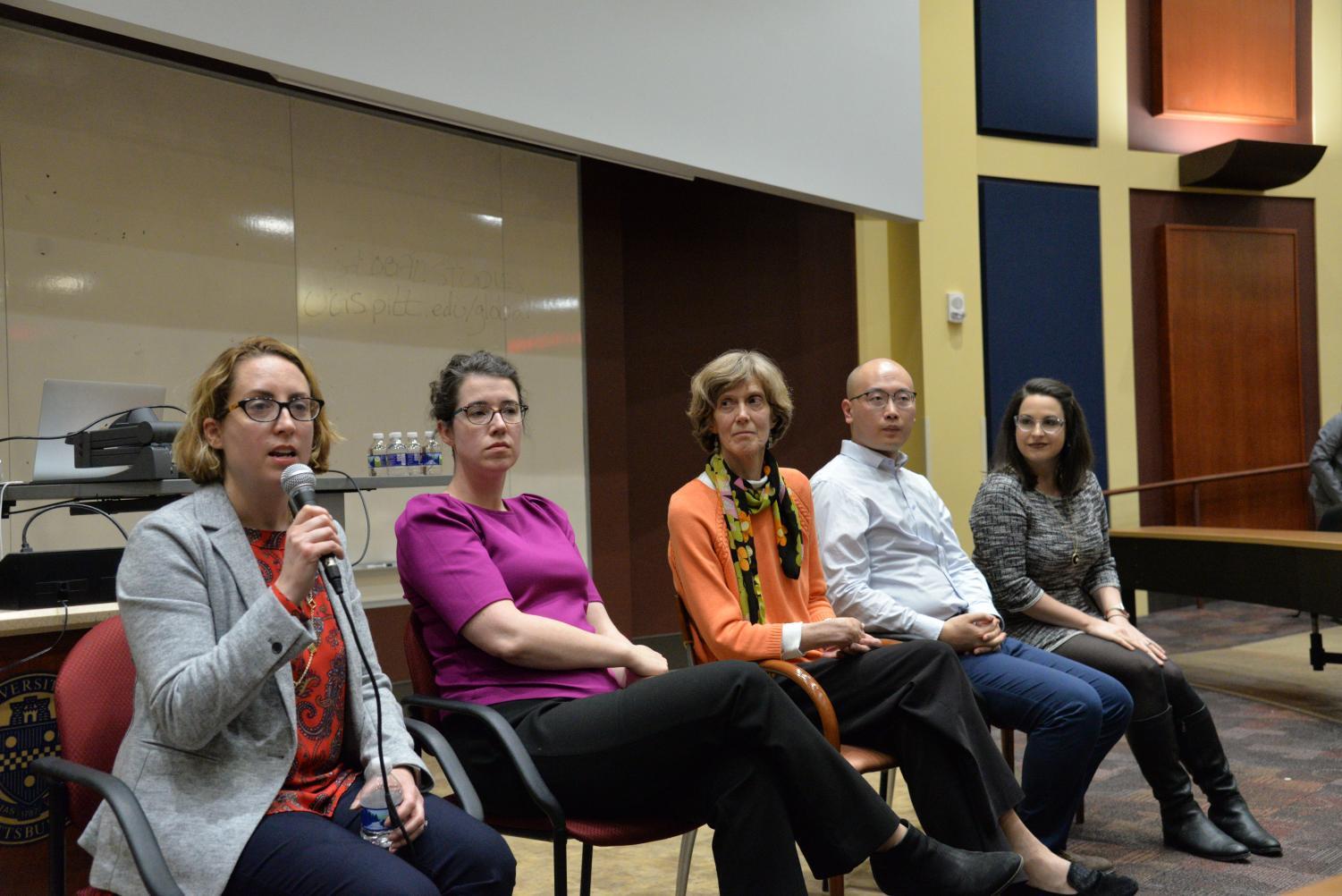Community gathers at teach-in to learn more about novel coronavirus


Health experts and Pitt faculty spoke in a Coronavirus Teach-in hosted by The Pitt Asian Studies Center and discussed the research being done to develop vaccines to treat the novel coronavirus and historical precedents for the prevention of diseases.
Pitt faculty and staff members gathered Wednesday evening to explain more about the novel coronavirus, the microscopic virus that has gained global attention.
Pitt’s Asian Studies Center hosted a Coronavirus Teach-in in a David Lawrence Hall lecture room nearly filled to capacity. The event featured a five-person panel staffed with experts across a variety of scholarly subjects, moderated by Michael Goodhart, the director of the Global Studies Center.
The presentations included background and contextual information about the outbreak, as well as preventative measures that can be taken to prevent the spread of the virus. The health experts on the panel also discussed the research underway to develop vaccines to treat the virus. The novel coronavirus has claimed the lives of more than 1,100 people globally, with 14 current confirmed cases in the United States.
Professor Amy Hartman, a researcher in the Center for Vaccine Research, highlighted the Wednesday announcement that the University is seeking to obtain samples of the novel coronavirus in an effort to develop an intervention, such as a vaccine.
“The lab is a hub for researchers trying to understand pathogenesis,” Hartman said. “We are the only facility on Pitt’s campus that has the ability to work with emerging coronaviruses.”
In order to provide some background on the virus, Dr. Megan Culler Freeman, a pediatric infectious diseases senior fellow in the School of Medicine, described the family tree of the novel coronavirus.
She said 2019-nCoV is just one strain of the coronavirus family of viruses, a group of RNA viruses that cause illnesses ranging from the common cold to more serious respiratory infections to the current disease under scrutiny. The most common COVID-19 symptoms include fever, shortness of breath and a severe cough.
Freeman mentioned two other coronavirus strains that are cousins to 2019-nCoV, Severe Acute Respiratory Syndrome and Middle East Respiratory Syndrome, which have caused outbreaks in the past. Scientists are gathering information about 2019-nCoV, which originated in Wuhan, China, by comparing it to these earlier viruses, but there are still unknown details surrounding how the novel coronavirus has spread to humans.
“For SARS and MERS, it was identified that there were intermediate species,” Freeman said. “Scientists are still working on what might be the intermediary species between the bat and human for the newest strain of the coronavirus.”
Another panel member, East Asian history professor Zhaojin Zeng, discussed how the culture and transportation system in China made the initial spread of the virus easier.
“Trains make stops and Wuhan is located right in the center of this massive railroad network,” Zeng said. “This outbreak occurred in December 2019, then came Chinese New Year, people celebrating want to get together and have big family gatherings and dinners.”
Although the virus outbreak has been most severe in and around the Wuhan area, history professor Mari Webel cautioned against strictly attributing the virus to a certain geographical region. Weber said while quarantine and isolation are beneficial in preventing the spread of diseases, they can also have consequences when they are implemented for the wrong reasons. “Focusing on people or places of origin when thinking about prevention and control of global disease must be done carefully to avoid racializing a disease or stigmatizing a population,” Webel said. “For example, Asiatic cholera, that tag stuck and served to stigmatize certain traveling populations.”
While there is still more research to be done on the novel coronavirus, health experts on the panel said this new strain is not unavoidable.
Dr. Kristen Mertz, a medical epidemiologist for the Allegheny County Health Department, said traditional public health strategies are applicable in minimizing the extent of the virus.
“We try to identify and isolate cases so they don’t infect other people,” Mertz said. “We also increase handwashing and use more personal protective equipment, such as gloves and masks and good disinfection techniques.”
Freeman said among those who do contract 2019-nCoV, most fatalities arise from older people with other illnesses that already have weakened immune systems, or from overwhelmed health care professionals who are constantly surrounded by infected people.
“When you think about how many people these doctors and nurses were already treating on a day-to-day basis,” Freeman said, “I’m sure that everyone is giving it their best effort, but you can imagine the stress to the system.”
While each presenter had their own specialty in analyzing 2019-nCoV, individual speakers also all emphasized the dangers of misinformation fueled by social media and sensational reporting.
Webel said it is vital to respect health organizations’ warnings and preventative strategies in order to avoid misleading information.
“Consult CDC recommendations, there is good health journalism to consult,” Webel said. “There are resources out there that can give us the best information at the present time.”
Recent Posts
Opinion | Final thoughts
Senior staff columnist Emily O’Neil discusses her final experiences at college and how the time…
Opinion | How to have a resisting-fascism summer
Contributing editor Emma Hannan talks about ways you can stay politically active while not in…
Who Asked? // What comes next?
This installment of Who Asked? by senior staff writer Brynn Murawski faces an uncertain future.
A Good Hill to Die On // Goodbye
In the final edition of “A Good Hill to Die On,” I decided to rant.
Review | Delayed checkouts at ‘The White Lotus’: An unoriginal third season
(Contains Spoilers) There is no meditation class, no reiki session, no nutritionally balanced, organic food…

